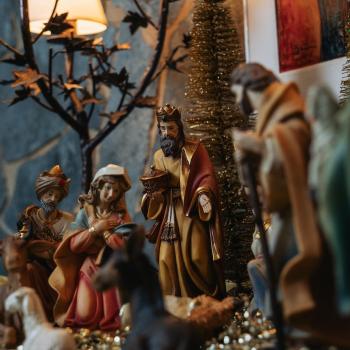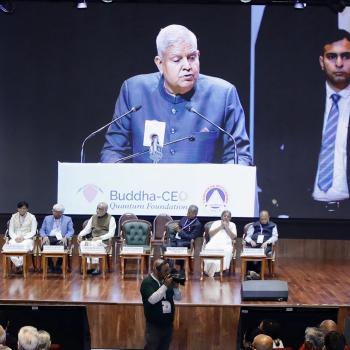 With much talk of the "decline" of the American mainline Protestant church (and membership statistics to prove it), we wondered, "What would a vibrant mainline church of the future look like?" We invited some of our favorite theobloggers to consider this question, and their responses follow.
With much talk of the "decline" of the American mainline Protestant church (and membership statistics to prove it), we wondered, "What would a vibrant mainline church of the future look like?" We invited some of our favorite theobloggers to consider this question, and their responses follow.
As you contemplate and wrestle with the question, what images and thoughts come to you? We invite you to join the conversation and post your own response below.
Our responders:
Nadia Bolz-Weber, Pastor of House For All Saints and Sinners in Denver, CO
Carol Howard Merritt, Pastor of Western Presbyterian Church in Washington, D.C.
Bruce Epperly, TheologyProfessor at Lancaster Theological Seminary and co-pastor of Disciples United Community Church
Richard Bass, Director of Publishing at The Alban Institute
Eric Hall, blogger and Ph.D. student
Talitha Phillips, student at San Francisco Theological Seminary
Carl Gregg, Pastor of Broadview Church in Calvert County, MD
Doug Pagitt, Founder of Solomon's Porch in Minneapolis, MN
Jason Derr, Theologian-In-Affiliation with the Progressive Christian Alliance
 Nadia Bolz-Weber
Nadia Bolz-WeberLess. It would be less. See, the church has bought into corporate culture to such an extent that we no longer remember who we really are. Following Jesus should never look like growing an empire. So, if we do the right things over the next ten to twenty years, I predict we will be less. We will stop doing poor knock-offs of what the society does well: pop music, play groups, drop-off dry cleaning, self-help, social work. What the church has sole responsibility for -- what the culture will never do -- is preach the Gospel and administer the sacraments. If we focus on what we are here to do, we will be less. And people will still gather in the name of the Three-in-One to hear good news and receive the means of grace, and then they will go out and be the church in this hurt and broken and beautiful world.
Nadia Bolz-Weber is a Lutheran pastor living in Denver, Colorado, where she serves the emerging church, House for all Sinners and Saints. She blogs at www.sarcasticlutheran.com and is the author of Salvation on the Small Screen? 24 Hours of Christian Television.
Read an interview with Nadia at Patheos here: Tattoo Faith
Return to Top
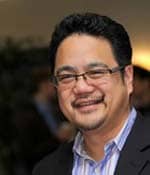 Bruce Reyes-Chow
Bruce Reyes-ChowA vibrant mainline church of the future is one where you walk in and you feel that there is life. You feel that there is theological integrity, and you feel like people in that space have been part of its birth. There is this sense that there is something greater happening and that it is because of this that people have gathered. In a reformed understanding where we believe God is unfolding some reality, it's a place that knows its role in that and is journeying along that way.
Bruce Reyes-Chow is the founding pastor of Mission Bay Community Church in San Francisco, CA and co-host of a weekly internet radio show, God Complex Radio. Bruce blogs at Bruce Reyes-Chow.
Read the Patheos interview with Bruce on the future of the denominational church here.
Return to Top
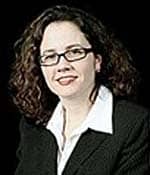 Carol Howard Merritt
Carol Howard MerrittGeneration X (those born from 1961 to 1981) is one of the most innovative generations that our nation has ever seen. We don't like to work for a boss, but we love to start new businesses -- and what we have done with technology, music, and books, we are also doing in the church.
A vibrant mainline church would support our generation in letting that creativity thrive. We can see it happening already. Our entrepreneurial pastors do this without any help and sometimes with great resistance. What would happen if we came alongside them and encouraged them?
The Millennials (those who follow Gen X) are a huge group. Some say that they're larger than the Baby Boomers. I think a vibrant mainline would prepare for their arrival.
Carol Howard Merritt is a Pastor of Western Presbyterian Church in Washington, D.C. She is the author of Tribal Churchand Reframing Hope. She co-hosts God Complex Radio with Bruce Reyes-Chow and blogs for Huffington Post. She blogs at TribalChurch.org.
Return to Top
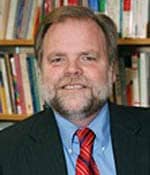 Bruce Epperly
Bruce EpperlyMainline Christianity is now at the margins of North American cultural and religious life; but the margins can become frontiers for a new vital faith. We need to be wildly creative and adventurous in exploring uncharted spiritual frontiers. The future will be a challenge and risk but our hope is in the integration of transformative spiritual practices, creative theological reflection, life-giving rituals of healing and wholeness, world-affirming mysticism, and committed ethical action for this earth and its peoples. We need to believe more, not less, for our calling is to claim our role as God's partners in healing the world.
Bruce Epperly is Professor of Practical Theology at Lancaster Theological Seminary and co-pastor of Disciples United Community Church in Lancaster, PA. He blogs at Faith Forward at Patheos. He is the author of seventeen books, including Holy Adventure: 41 Days of Audacious Living.
Return to Top
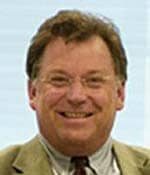 Richard Bass
Richard BassThe question, "What would a vibrant mainline church look like?" may perhaps more appropriately be stated as "What do vibrant mainline churches look like?" because there are a good number of vital congregations in the mainline. The mainline denominations, once dominant among religious traditions in America, play a very different role today. And that is just fine by us mainliners. Vibrant mainline congregations provide communities where we can worship God in ways that allow us to connect with others through time and space via our traditions and practices and where we can demonstrate our care for the world, our pursuit of God's justice for the world, by loving and serving our neighbors.
Richard Bass is the Director of Publishing at The Alban Institute. He blogs at the Alban Roundtable blog.
Return to Top
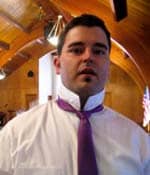 Eric Hall
Eric HallFirst, a vibrant mainline church of the future would have great child and hospice care. If the first element is simply a condition for the success of any community organization in today's world, together the statement claims that those who are literally "useless" socially are of value before Jesus.
Second, in a vibrant mainline future church there would be a refusal to reduce the Gospel to any social agenda. While mainliners ostensibly stand with homosexuals and the environment, we need not reduce the Gospel to such. The Gospel is found solely in Jesus and the hope of his eschatological peace, to which our actions only imperfectly testify.
Eric is currently writing his dissertation on Authenticity and God; he also blogs for Homebrewedchristianity.com, engages in vestry projects, and works on his vertical in his spare time.
Return to Top
 Talitha Phillips
Talitha PhillipsSkipping the generalities, here is what one vibrant church does look like: in addition to a sanctuary and classrooms, it has five greenhouses and a tractor. They didn't look for these things, but God gave them, so they learned to use them. They now feed hungry people, train the uneducated in agricultural skills, wonder at creation, and call for a large-scale relocation from industrial agriculture to local and sustainable food systems. I believe that more churches will look like this one: the withdrawing to an alternative lifestyle, the healing and giving, and the engagement outward with the powers that be.
Talitha Given Phillips is a student at San Francisco Theological Seminary, a candidate for ordination in the PC(USA), an aspiring agrarian, and also trying to find a good feminist biblical scholar hat to wear. She blogs at Madame Future Moderator.
Return to Top
 Carl Gregg
Carl GreggThe key word is the indefinite article "a." There are limitless possibilities for what "a" vibrant mainline church could look like, but there are extremely few instances in which "the" mainline church -- as a unique and specific noun -- has a vibrant future. A vibrant mainline church of the 21st century will be one among many nodes on a decentralized network, and not an imitation of a centralized model. The vibrant mainline church will be "bottom-up," participatory, and collaborative.
Carl Gregg is Pastor at Broadview Church in Calvert County, MD. A recent graduate of the Diploma in the Art of Spiritual Direction program at San Francisco Theological Seminary, he is currently working on the dissertation for his Doctor of Ministry. Carl blogs at Faith Forward at Patheos.
Return to Top
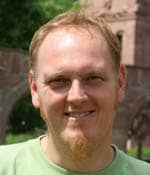 Doug Pagitt
Doug PagittIn the last 250 years American culture has moved through three cultural epochs -- The Agrarian Age, The Industrial Age, The Information Age -- and now is entering a fourth Age, what I call The Inventive Age.
Modern denominations were a cultural artifact of the Industrial Age. Denominations were a powerful, culturally appropriate way for churches to organize and structure in the Industrial Age.
The transition into the Information Age changed the cultural norms and expectations, and many denominational churches struggled in an age when people were more interested in knowledge than "branded Christianity."
As we transition from the Information Age into the Inventive Age, mainline denominational churches may find new possibility and life. I hope mainline churches can start fresh in this new age that is built on participation, collaboration, creation and beauty.
Doug Pagitt is the founder of Solomon's Porch in Minneapolis, MD, and was one of the founders of Emergent Village. His latest book, Church in the Inventive Age, will be published August 2010. He blogs at Doug Pagitt.com.
Return to Top
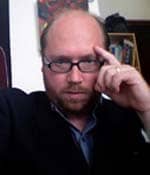 Jason Derr
Jason DerrGraphic-novel writer Grant Morrison, with runs on books like New X-Men, is worth listening to. Trapped by thirty or more years of story, Morrison's solution was "super-saturation." The past was a resource, but the stories of the future were not pre-determined. The future of mainline Christianity will be super-saturated, in-touch, and in-love with its history and traditions, from house churches to Cathedrals. When we become super-saturated, the future becomes something gifted by the past but not locked there for "tradition's sake." Super-saturation lets us recognize that doing faith is a living thing, evolving from context, and free to continue evolving.
Jason Derr is a Journeyman, Independent Scholar and Theologian-In-Affiliation with the Progressive Christian Alliance.
Return to Top
Read more articles on the future of the mainline church at Patheos here.
7/28/2010 4:00:00 AM

